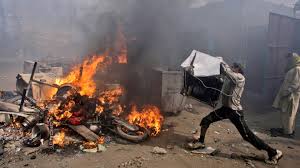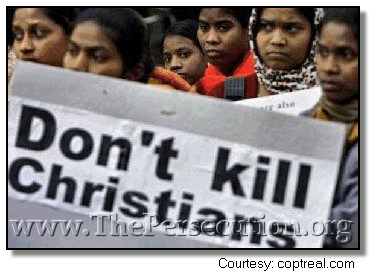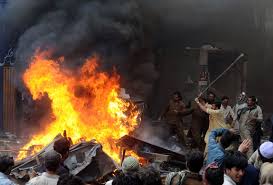Christian Science Monitor
Christians and civil society activists across Pakistan took to the roads on Sunday demanding government protection for the rising persecution of religious minority communities which make up less than five percent of the country.
The protests come a day after hundreds of Muslims rampaged inside a Lahore neighborhood of at least 50 Christian homes. The rioters apparently were outraged over accusations that a local Christian from the area had committed blasphemy. The accused blasphemer had already been arrested the night before, and the Christians in the area fled the same night in expectation of violence.
The police have arrested dozens in connection to the rioting. But campaigners for religious minorities here note that arrests after past incidents have almost never led to punishments, and the blasphemy law that enables communal unrest remain on the books.
“This current government passed many constitutional amendments during the last five year but did not touch the blasphemy law, even though everyone in the parliament was on board for the revisions in the constitution,” says Nadeem Anthony, a lawyer in Lahore who defends those facing a possible death sentence under the law.

Three of Mr. Anthony’s relatives living in the Lahore neighborhood were displaced by the destruction.
“Instead of protecting them and their homes, the police told the Christians to flee from the area,” claims Anthony who visited the Lahore locality on Sunday with his relatives from the area.
Many locals corroborate this saying that despite knowing of tensions in the area since Friday, the police did not swing into action until late Saturday. On Sunday, under heavy police deployment, some of the affected families visited the locality to measure their losses who are currently living with their relatives elsewhere in the city

Anthony says the government has done almost nothing in response to past attacks on Christians. To date, no one has been convicted in the 2009 attacks on Christians in Gojra that left at least nine dead and dozens of houses destroyed. Similarly, the Muslim cleric who tried to falsely frame a Christian girl of blasphemy last year was ultimately released after being arrested.

Law enforcement authorities say that arrests are being made in connection to this weekend's mob attack.
“We have started the arrests, many have been rounded up but we cannot give exact figures as yet. However, there are 83 people nominated in the case that we have identified to be behind the attack,” says Sajjad Ahmed, a local police officer handling the case.
Local reports suggest more than 100 people have been arrested so far. Besides the arrests, the government has promised to rebuild the burnt down houses and has also announced monetary compensation for the victims.
The Chief Justice of Pakistan has also taken a suo-moto notice of the incident and will hold hearings on the case tomorrow.
But human rights activists criticize these steps as a cosmetic measure and say the government needs to seriously reconsider its policy towards discrimination of minorities instead of having reactionary responses.

“The Punjab government had enough time to act but it woke up after things went out of control,” says Zaman Khan, spokesperson of the Human Rights Commission of Pakistan. The reason for the delayed action Mr. Khan adds is the prevalent anti-minority mindset inside the government. “Even the Pakistani constitution is anti-minority. It does not allow the head of the country to be a non-Muslim.”

The human rights activist slammed the main political parties like the PPP and the PMLN, which are the traditional ruling elite in the country, for always siding with the religious extremists.
“Both these parties woo extremists groups, which ... are a creation of the military’s Islamization policy," says Khan. "[I]nstead of stopping them, mainstream parties have used the groups for their political benefit.”

Khan points to instances where both parties have done so in the past. “For example, the PPP passed legislation against Ahmadis declaring them non-Muslims during the '70s to get support of the religious parties, and it was [under the PMLN in the '90s that the] mandatory death sentence was introduced for blasphemy law. Also PPP and PMLN leaders in Punjab have been regularly seen attending political gatherings of those with links to [anti-Shiite militant group] Lashkar-e-Jhangvi. It is an open secret."

 The human rights activist slammed the main political parties like the PPP and the PMLN, which are the traditional ruling elite in the country, for always siding with the religious extremists.
“Both these parties woo extremists groups, which ... are a creation of the military’s Islamization policy," says Khan. "[I]nstead of stopping them, mainstream parties have used the groups for their political benefit.”
The human rights activist slammed the main political parties like the PPP and the PMLN, which are the traditional ruling elite in the country, for always siding with the religious extremists.
“Both these parties woo extremists groups, which ... are a creation of the military’s Islamization policy," says Khan. "[I]nstead of stopping them, mainstream parties have used the groups for their political benefit.”
No comments:
Post a Comment